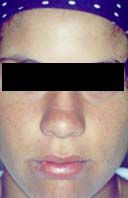Introduction
Allergic rhinitis is an overreaction of the immune system(body defense system that often helps in protecting your body from non infectious inhaled particles) to the allergen. Allergen is any substance that can trigger allergic reaction.
Types of allergens :
- aeroallergen(inhalen) : molds, pollen, animal dander and fungus
- food allergen
Signs & symptoms
- Repetitive sneezing
- Profuse watery runny nose (thin and clear)
- Nasal obstruction or congestion.
- Post nasal drip that trickles to your throat and causes coughing.
- Itchy nose, eyes, ears and throat
You may have many symptoms or just one. Symptoms can occur in as little as 5 minutes after you have been exposed to the allergen, or they may take longer to develop (typically 3 to 6 hours).
Symptoms that may take longer to develop include :
- A stuffy nose, possibly with frequent sniffing
- Eyes are sensitive to light
- Irritability
- Loss of energy
- Poor sleep
- Breathing through the mouth because the nose is blocked
- Altered sense of smell
- A chronic cough
- Problems with sinuses and Eustachian tube
- Intense of pressure in an ear or difficulty hearing
- Discomfort or pain in the face
- Dark circles or patches under the eyes (allergic shiners)

Crease on the nasal bridge
- Frequently rubbing the nose, which may cause a crease on the bridge of the nose (allergic crease).
- Frequently rubbing the nose upward with the palm of the hand to reduce itching and open the nasal passages (allergic salute). This is commonly seen in children.
Symptoms of allergic rhinitis generally last for life, although the symptom types.
Complications
Frequent swelling and inflammation causes blockage of the sinus pathway and Eustachian tube. This leads to :
- Sinusitis
- Middle ear effusion
Treatment
Avoidance of allergen is very important (doctor can help to identify the allergen by doing skin prick test or blood test)
Multidisciplinary approach
- Allergic diseases specialist
- Immunology
- Ear Nose and throat surgeon
Medications that can help relief the allergic symptoms includes :
- Antihistamines
Antihistamines lessen symptoms of hay fever and other allergies. - Decongestants
Decongestants reduce congestion and blockage. - Antiallergy nasal spray
Sodium chromoglycate nasal spray to avoid allergic reaction - Corticosteroids intranasal spray
Corticosteroids are effective and can be given by injection, pill or spray. - Immunotherapy
Immunotherapy is a form of treatment that can make an individual less sensitive to allergens. Immunotherapy involves the treatment with increasing doses of allergen extract given regularly to the patient by injection or sublingual (tablet or drops under the tongue).
Prevention
Avoidance of allergens.
| Last reviewed | : | 26 April 2012 |
| Writer | : | Dr. Hjh Saraiza Abu Bakar |
| Reviewer | : | Dato’ Dr. Narizan Ariffin |







